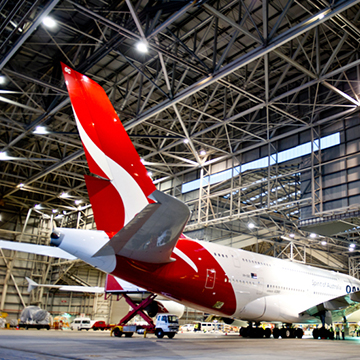Qantas explains call centre closures
QANTAS has decided to ‘consolidate’ its three Australian call centres into one facility based in Hobart by 2016 – closing its Melbourne and Brisbane call centres. The move is part of its previously announced $2 billion transformation program and associated reduction of 5000 jobs.
The decision came after a comprehensive three month review and will ultimately result in the closure of its Brisbane and Melbourne call centres. Queensland Premier Campbell Newman was “disappointed” at the closure of the Brisbane centre, but said Qantas has shown its commitment to the state with the move of its heavy engineering facility to Brisbane Airport.
But Queensland ASU Secretary, Ms Julie Bignell described the act as “a slap in the face of Qantas call centre professionals who were working with their union to negotiate in good faith with Qantas”. 
Ms Bigell said the union was stunned by the timing of the announcement, with a Qantas making the it public ahead of a national meeting organised to discuss the future of the Australian call centres.
“Rather than waiting for that meeting, they make the announcement the day before,” she said. “It is an appalling lack of process and really typifies what we have come to expect from Qantas.
“It is unclear at this stage, but we have grave concerns that a significant proportion of the Qantas telesales business could be off shored in the future,” Ms Bignell said.
“This is a bad decision with devastating consequences for hundreds of workers and not a positive move for the future of Qantas.”
Qantas Domestic chief executive officer, Lyell Strambi, said operating three call centres in different states was simply not efficient, particularly as customers increasingly turn to online, mobile and social media to communicate with Qantas.
“We are facing some of the toughest conditions Qantas has ever seen, which means we have to look at ways to become more efficient and remain competitive,” Mr Strambi said.
“Having call centres in three different states presents a number of challenges including property costs, duplication of management and operational complexity.
“In addition, more people are using online channels to manage their travel needs. Since 2005, call volume has halved and we now see 30 times more visits from customers to qantas.com than we receive in our call centres. This is a long-term change in customer behaviour that we expect to continue.”
Mr Strambi said Qantas had invested in new customer service technologies in recent years and by the end of this month, one million people will have downloaded the Qantas app for mobile devices – a channel that did not exist 12 months ago.
Mr Strambi said consolidating three Australian call centres into one location would ensure Qantas continues to provide the level of customer service that people expect, as well as delivering significant cost savings for the business.
“We are proud that we answer calls from Australia, in Australia, but it is not efficient to have three sub-scale facilities,” he said.
“Hobart was the logical choice for us to base our Australia call centre operations because of the modern facilities, the space available within the existing site and the ongoing costs of operating there.
“The Tasmanian Government has been very supportive of our Hobart call centre and is passionate about the future of Qantas Group operations in the state.”
Mr Strambi said employees in the Brisbane and Melbourne call centres will be offered re-deployment to Hobart, including payment for relocation costs, should they wish to move interstate.
“We will commence an expression of interest process with our employees to understand how many would like to move to Hobart. Employees who choose not to move interstate and remain employed until the closure of their centre will be provided redundancy packages,” he said.
“Today’s decision in no way reflects on the contribution of our contact centre workers. We want to thank all of our employees for their hard work.
“These are decisions we make in full knowledge of the impact on our people, but also the need to protect thousands of Australian jobs across the Qantas Group by taking action to strengthen our company.”
This announcement does not impact Qantas’ New Zealand call centre operation which has operated for over 10 years and mostly handles calls from English speaking customers from outside of Australia.
Qantas has operated its call centre in Hobart since 2000 and currently employs 200 full time equivalent employees. The Brisbane call centre, which employs around 200 full time equivalent employees will be closed by 2016.
The Camberwell call centre, which employs 250 full time equivalent employees will be closed by mid-2015.
Qantas has offered to provide affected employees with transition support and redundancy packages in excess of regulatory requirements. Qantas will also continue to use call centres in overseas markets answering calls originating from non-English speaking customers in locations such as Japan and South Africa.
ends

 How to resolve AdBlock issue?
How to resolve AdBlock issue?